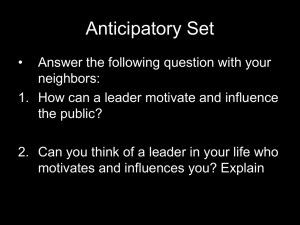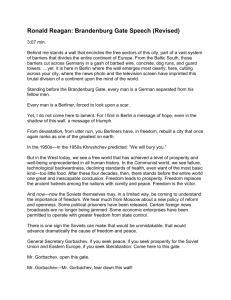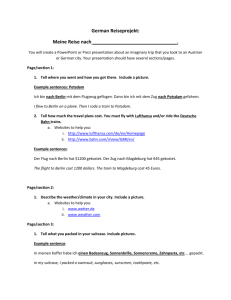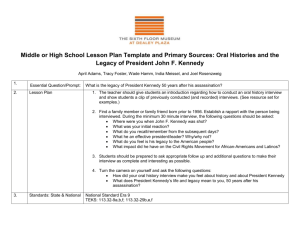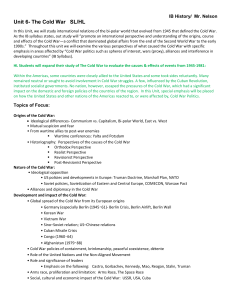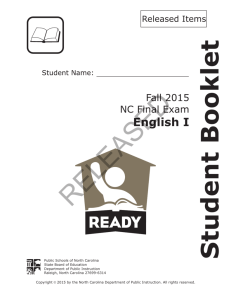Communication 1010 – Speech Outline
advertisement
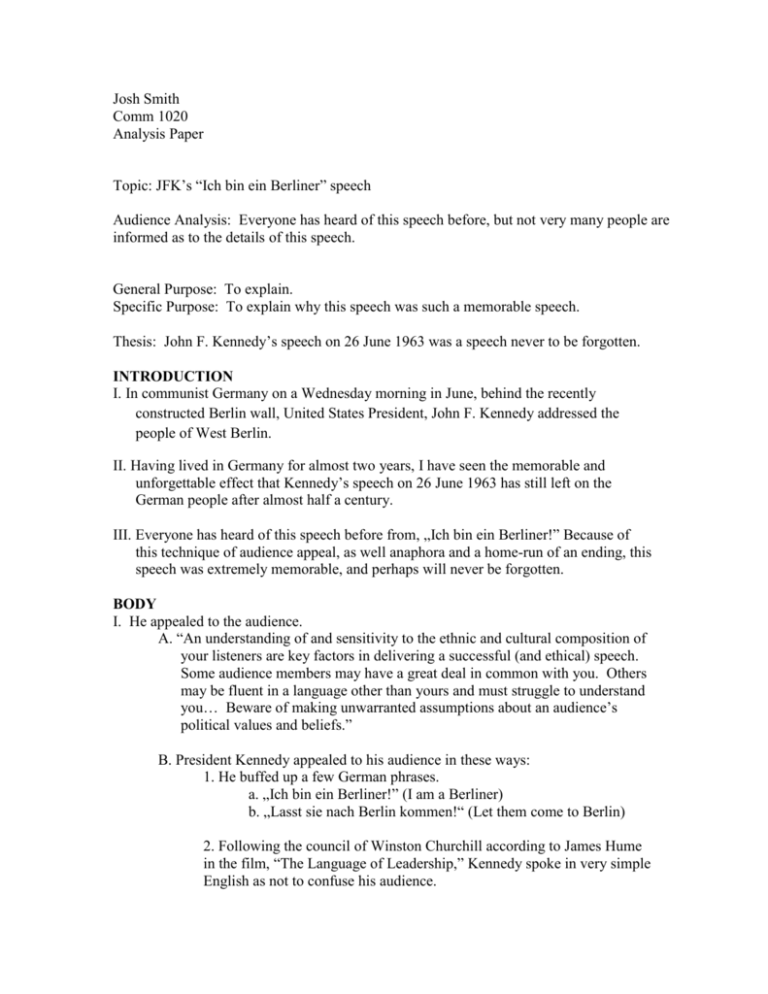
Josh Smith Comm 1020 Analysis Paper Topic: JFK’s “Ich bin ein Berliner” speech Audience Analysis: Everyone has heard of this speech before, but not very many people are informed as to the details of this speech. General Purpose: To explain. Specific Purpose: To explain why this speech was such a memorable speech. Thesis: John F. Kennedy’s speech on 26 June 1963 was a speech never to be forgotten. INTRODUCTION I. In communist Germany on a Wednesday morning in June, behind the recently constructed Berlin wall, United States President, John F. Kennedy addressed the people of West Berlin. II. Having lived in Germany for almost two years, I have seen the memorable and unforgettable effect that Kennedy’s speech on 26 June 1963 has still left on the German people after almost half a century. III. Everyone has heard of this speech before from, „Ich bin ein Berliner!” Because of this technique of audience appeal, as well anaphora and a home-run of an ending, this speech was extremely memorable, and perhaps will never be forgotten. BODY I. He appealed to the audience. A. “An understanding of and sensitivity to the ethnic and cultural composition of your listeners are key factors in delivering a successful (and ethical) speech. Some audience members may have a great deal in common with you. Others may be fluent in a language other than yours and must struggle to understand you… Beware of making unwarranted assumptions about an audience’s political values and beliefs.” B. President Kennedy appealed to his audience in these ways: 1. He buffed up a few German phrases. a. „Ich bin ein Berliner!” (I am a Berliner) b. „Lasst sie nach Berlin kommen!“ (Let them come to Berlin) 2. Following the council of Winston Churchill according to James Hume in the film, “The Language of Leadership,” Kennedy spoke in very simple English as not to confuse his audience. 3. The president brought a distinguished guest with him, General Lucius D. Clay. General Clay is considered the father of the Berlin Airlift, so naturally a beloved individual in the city of Berlin. For this reason, President Kennedy allowed the General to greet the Germans at the beginning of his historical speech. II. Anaphora A. ”Repeating key words, phrases, or even sentences at various intervals throughout a speech creates a distinctive rhythm and thereby implants important ideas in listeners’ minds. Repetition works particularly well when delivered with the appropriate voice inflections and pauses... In one form of repetition called anaphora, the speaker repeats a work or a phrase at the beginning of successive phrases, clauses, or sentences.” B. In the second half of his speech, the president repeated a few phrases multiple times to really drive his point in. He used repetition as a device, as it was said in “The Language of Leadership.” “There are some who say… Let them come to Berlin!” President Kennedy was comparing view and ideas of other people in the world concerning communism and a republic and capitalism, etc. to the truth of how it is and how Berlin was a prime example of how communism was not functional for freedom of a people. III. President John F. Kennedy displayed a very strong ending. A. “A good conclusion increases the odds that the speaker’s message will linger after the speech is over, and a speech that makes a lasting impression is one that listeners are most likely to remember and act on. To accomplish this, make use of the same divices for capturing attention descrived for use in introductions- quotations, stories, questions, startling statements, humor, and references to the audience and the occasion.” Hume said to end in emotion, with pride, hope love; sound the trumpet. B. Kennedy closed his speech with the phrase that really gained the attention of the crowd toward the beginning of the speech, „Ich bin ein Berliner!” This expressed his pride in Germany as signifying his symbolic German citizenship. CONCLUSION I. In conclusion, his anaphora, but more importantly his appeal to the audience and strong ending has made this speech by President John F. Kennedy one of the most memorable speeches in German and American history. II. Let us never forget this speech and the impact it has had on the American-German relationship and on history itself. Thank you JFK! __________________________________________ Presentation Aid: Supporting Materials (Citations) 1. O'Hair, Dan, Hannah Rubenstein, and Robert A. Stewart. A Pocket Guide to Public Speaking. 3rd ed. New York, NY: Bedford/St. Martins, 2010. Print 2. "Ich Bin Ein Berliner." Wikipedia, the Free Encyclopedia. Web. 29 May 2011. <http://en.wikipedia.org/wiki/Ich_bin_ein_Berliner>. 3. The Language of Leadership: The Winston Churchill Method. Perf. James Hume, . Films for the Humanities and Scientists, Inc.: Film.

